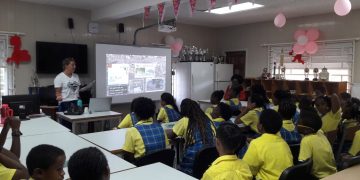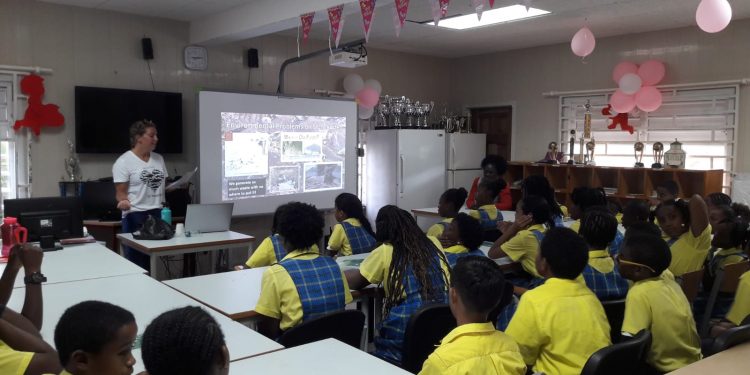PHILIPSBURG, Sint Maarten – In the coming months, the Nature Foundation St Maarten will conduct interactive presentations about the impacts of trash on our environment and the need to reduce single-use plastics to primary school students on St Maarten. The Foundation is planned to visit a broad range of primary schools to show the students what littering does to our wildlife and marine life and why single-use plastics should be urgently reduced on St Maarten.
Part of the Nature Foundation’s mission is to educate the public on the environmental impacts associated with single-use plastics, which is accomplished through their ongoing ‘Reduce and Reuse’ project. The Foundation believes education is the key and it is important to visit local schools, businesses, and communities to spread awareness about the harm of plastics to our environment, the significance of a single-use plastics ban and how to reduce your own single-use plastic consumption.
Nature Foundation Intern, Grace Hansen, has developed a 45-60 minute presentation, including a fun activity, to bring to schools and encourage greener habits among students. “We must get the attention of children in school because it is their future that is directly at risk. Kids their age are already seeing our trash wash up on their beaches. Their swimming water is polluted, and they are forced to either avoid playing in the ocean completely, or risk infectious diseases that can be carried by the plastics, waste water and other trash. If we do not act soon, children on St. Maarten may have a similar future. It is also our duty to take responsibility of our actions and clean up the planet” explained Grace Hansen.
Of all marine biodiversity, 96% is vulnerable to plastic pollution each year as they ingest and get tangled in the floating debris. Though trash may be discarded properly, it still ends up in our oceans every day. Through wind and storm water runoff, our waste enters and kills thousands of animals each year. The Nature Foundation calculated that Dutch St Maarten alone uses more than 1.4 billion plastic straws a year; straws are used for a few minutes and last forever in the environment. If current trends continue there will be more plastic than fish in the ocean by 2050.
Additionally, microplastics are of major concern. Plastic has extreme durability therefore it does not break down, only into smaller pieces. Plastic particle less than 5 millimeters (or the size of a small red ant) is considered a microplastic. Bottled water manufacturers do not face regulatory limits regarding how many microplastics are allowed in your bottled water. A study conducted in 2019 discovered 10,000 pieces of plastics per 1 liter of water in Nestle Pure Life. The effects of microplastics on humans remains unknown, but no one wants to be ‘patient 0.’
“There are many alternatives to single-use plastics, however it is a behavioral change among people themselves that is going to solve this problem. Raising awareness of the harmful impacts of plastics is important to creating a community of pollution fighters that will protect and restore the environment” mentioned a Nature Foundation statement. St. Maarten is a beautiful island that attracts millions of visitors from all over the world. The Nature Foundation wants to keep it that way. The community’s help in cleaning up and reducing plastic waste will go a long way in ensuring the preservation of the beauty Sint Maarten is known for.
Interested schools, businesses or other organizations can schedule a presentation by contacting Grace Hansen at: info@naturefoundationsxm.org


















